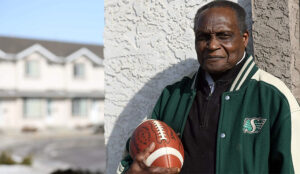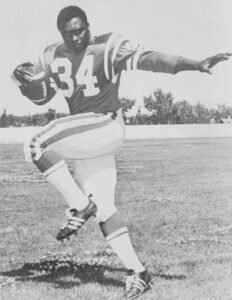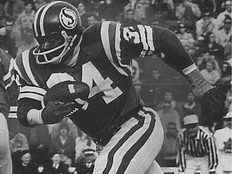
“You start learning what’s going on. It was pretty demeaning,” Reed said.
Reed would become a Saskatchewan Roughriders legend, scoring more touchdowns and rushing for more yards in the 1960s and ‘70s than any professional football player in Canada or the U.S. had before. But he spent his first two seasons living in Regina hotels because no one would rent to a Black man.
“I think it might be hard for a lot of people to understand,” Reed said. “I hope people will open their eyes and see what went on, what’s going on. It might not be quite as bad as south of the border, but for Aboriginal, Black, other — we need to make the situation a better one.
Reed is now 81 years old. His playing days have long since ended, but he and his wife, Angie, have chosen to stay in Regina.
Reed says there’s more to his story than touchdowns, cheering crowds and Rider Pride.

Maggie and George Reed Sr. lived in the “coloured” section of Vicksburg, Mississippi, in the 1930s. Segregation, enforced by the justice system and the Ku Klux Klan, maintained the racist social and economic hierarchy.
George Reed Jr. was born into this environment on Oct. 2, 1939, the third of 12 kids.
Reed later accepted an offer from Washington State University in 1959. That’s where he met Angie Levias at a family social gathering. She would become his wife.
Several teams in the National Football League showed interest in Reed. But like other Black players, Reed had heard Canada was more inclusive. He signed a contract with the Saskatchewan Roughriders of the Canadian Football League, and arrived in Regina in 1963.
But off the field, Reed was questioning his decision to move to the Canadian Prairies.
“I discovered it wasn’t as tolerant as people made it out to be…being a Black man in Western Canada in the 1960s could be, to put it mildly, inconvenient.”
He said most teammates were supportive, but that didn’t mean everyone was equal. Some CFL players refused to shower at the same time as their Black teammates.
Reed said Black players on other CFL teams would get prank calls from teammates pretending to be members of the KKK. One Calgary coach forbade Black players from bringing white dates to the team banquet, even though one Black player’s wife was white.
Reed also discovered subtler forms of racism. He laboured under an unspoken quota system capping the number of Black players to four or five per team, regardless of their talent. They were pitted against each other, knowing that a new arrival would mean a Black veteran would have to be let go.
Their status was tenuous, so they played through debilitating injuries. Reed, for example, played for two months on a broken tibia. “You never knew if you’d be able to stay and play. I needed to find a way to help and support my family,” he said.
In 1965, Reed was named the CFL’s most outstanding player. He said people started treating him differently. He was given a membership at the Wascana Country Club, which at the time banned Black and Jewish golfers. Angie moved up from Seattle with their first child, Keith, after Reed finally found a place to live.

“If you were a somebody, they welcomed you,” he said. “I didn’t have a colour to them anymore. I guess I wasn’t Black in the traditional sense.”
In 1966, Reed helped bring Saskatchewan the first Grey Cup in its 56-year history. He was named the game’s most valuable player. He continued his torrid pace into the 1967 season, scoring 15 touchdowns and rushing for a then-record 1,471 yards.
The Reeds, who now had three children, would soon be reminded that some fans’ adulation was conditional.
In 1967, Reed was interviewed by a Toronto Telegram reporter about the riots in Detroit and other U.S. cities throughout that summer. Up to that point, Black CFL players had rarely commented on racism publicly. Reed said he decided to give his honest opinion.
“There is flagrant discrimination against Negroes in Regina,” Reed said. “My wife has become so defensive that when she leaves the house she’s like a coiled cobra ready to strike at anybody.”
He told the reporter that living in Regina was like being in the heart of Alabama.
Reed said star quarterback Ron Lancaster and other close friends were supportive, but others labelled Reed ungrateful, conceited and worse. His off-season employer, Molson, took away his company vehicle and demoted him for six months.
When Reed retired in 1976, he’d obliterated the all-time league records in touchdowns, rushing yards and every other running back category.
Reed said he hopes the Black and Indigenous Lives Matter movements will help accelerate change in the U.S. and Canada.
“It took a policeman, an asshole, to put his knee on a guy’s neck for people to notice. What if it wasn’t [caught on video]? Would anyone have said anything?” Reed asked. “Black lives mattered way before [George Floyd] got killed.”
While Reed thinks broader change is possible, “it’s not going to happen overnight. There’s a percentage of people that just won’t listen.”
Reed’s daughter, Georgette, feels the same way.


